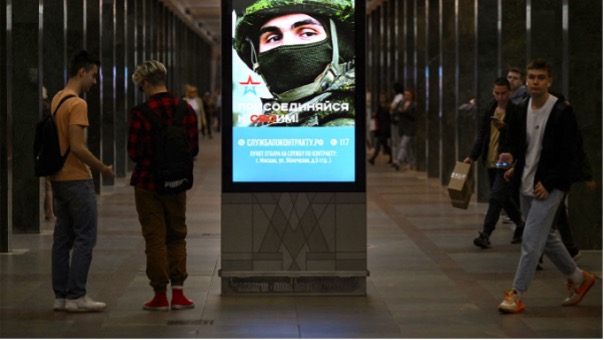President Putin has only been able to sustain his war by bribing the poor, desperate and marginalised. The deal has been straightforward: sign up and you will be paid a fabulous lump sum and generous salary. You will receive benefits and a veteran’s pension. In the event of your death your family will be compensated. A surprising majority believe they are signing one-year contracts and are unaware that service is indefinite until the end of the war. Even when told they still sign on, taking the gamble that the war will be over soon and anxious not to miss out on a get-rich-quick scheme. Just five percent of volunteers have a higher education and 40% are 50-year olds and older (last year the recruitment age was increased to 70 years-of-age, and the oldest recorded death has been a 72 year-old).
The sums offered are stupendous. The one-time signing on bonus in Nizhny Novgorod can be as high as 3 million roubles ($38,300). Impoverished Bashkortostan – which has suffered the most war losses with over 3,100 confirmed volunteer deaths – offers 1.5 million roubles. ‘You’ll earn 3.7 million roubles [$44,000] your first year!’ shouts an advertisement in Novosibirsk. Who wants to be a millionaire? The reality, naturally, is different and the subject of this article.
The reality of life in occupied Ukraine
A volunteer may earn a monthly salary of between 200,000–300,000 roubles $2,550-$3,800). This is many times higher than the average Russian salary and unimaginable in the poorer regions of Russia. Yet the soldiers are not kings of the castle. The costs of serving in occupied Ukraine swallow salaries. Some of those costs are itemised below:
Food: Soldiers have to supplement inadequate rations by buying their own food. Locals routinely double and triple prices to Russian soldiers because they know they can pay. A monthly bill can run to 20,000-30,000 roubles ($255-$380). In one unusual case, a Russian soldier serving in 68 Motor Rifle Division on the Kupyansk front saved on food money by turning cannibal and eating a dead comrade. Reportedly this provided him with sufficient meat for two weeks.
Water: Occupied Donbas is a water disaster area with daily rationing and water cuts. Tap water – when it runs – is undrinkable (‘you cannot even wash in it’, one soldier has averred). A daily five litres of water costs 100-150 roubles, or around $38-$57 per month.
Sex: The Donbas has been transformed by a sex industry chasing roubles. As much as 500,000 roubles ($6,380) can be earned in week. Roughly one third of prostitutes work from stationary brothels and the remainder do ‘shift work’, or two-week shifts in rented houses in Mariupol, Berdyansk, Melitopol, Donetsk and Luhansk. A chat with a prostitute can cost 15,000 roubles ($190). One night costs 120,000 roubles ($1,530). Payments are in cash. ‘It seems to me that 90% of my clients feel regret [about joining the war],’ one prostitute has opined. Another has said that every second order she gets is ‘just to sit down and talk, because they don’t see anything there except men and corpses.’
Cigarettes: The issue cigarettes are unsmokable and thrown away. Cigarettes are sold at inflated prices in the Donbas (around 200 roubles or $2.50 per packet) and are smoked apace. Roughly half of all Russian males smoke, one of the highest rates in the world. Smoking in the army is widespread.
Alcohol: There are no numbers for alcohol consumption. There is abundant anecdotal evidence that the high alcohol consumption rates of Russian civilian society – and alcoholism – have been exported to the frontline. Indeed, some volunteer to get their lives in order, having lost control to alcohol in their home towns and villages.
Clothing: Soldiers invariably resort to buying their own uniforms, especially cold weather clothing. There are mobile ‘uniform shops’ operating in the Donbas. They can charge as much as 10,000 roubles for a uniform ($125), or twice the going rate in a shop in ‘the mainland’ (it is telling that Russian soldiers refer to Russia as ‘the mainland’, a psychological affirmation that they are in a different country).
Kit: Almost anything a soldier might want can be and is bought by the individual. ‘The only thing they gave us was a rifle. Everything else, from underwear to helmets, we had to buy ourselves,’ one soldier has said. Prized and expensive items are proper body armour sets. Radios (walkie-talkies) are another essential. Russian media run stories of scandals involving kit stolen from barracks, re-appearing for sale on the frontlines.
Bribes: Russian officers have become a bribe-taking rentier class. Soldiers must pay bribes to avoid being sent on an assault, or simply to have a day off.
A dugout: To survive in the Donbas you have to be underground. Building a dugout can be expensive: as much as 100,000 roubles or $1,270 including materials.
Cars and gasoline: The soldiers have to buy their own transport. Typically a group pools funds. Cars are needed for resupply tasks and are occasionally even used in attacks (the ‘Lada assaults’). Gasoline also has to be bought at personal expense.
Medicines: Russian Army medical care remains sub-standard. Soldiers with medical problems (the average age of volunteers is in the 40s) buy their own medicines, commonly ordering through relatives in Russia.
Drones (and batteries): Units have to buy their own drones (supplemented by volunteer groups in Russia that crowd-fund). Prices vary but a new drone (there is a booming black market) can cost 180,000 roubles ($2,300).
Starlink: The soldiers have to pay for their Starlink terminals and connection (and replacements when they are destroyed or damaged). The monthly tariff is in the order of 24,000 roubles ($305).
Generators and gasoline: Daily consumption is in the order of 10 litres, costing 600 roubles, or 18,000 roubles per month ($230).
Accommodation: Soldiers away from the front line may rent properties. A typical rent is $950 per month – or Moscow prices. A monthly gas bill – when not interrupted – is around 3,000 roubles ($38).
Funeral costs: The state is supposed to bear funeral costs. However, soldiers chip in to help pay for each other’s funerals. ‘There wasn’t a single month of service when I didn’t chip in for a comrade’s funeral,’ as one soldier told, ‘You chip in as much as you have conscience.’ A typical donation is in the order of 25,000 roubles or £320.
Taxi home: Soldiers are given leave (but not the convicts who have almost no rights). Due to the lack of transport infrastructure, a taxi is the popular way to get home (on occasions 1,000s of kilometres). A taxi to the relatively close Rostov-on-Don can cost 25,000 roubles or $320. A journey to Moscow can reach 44,000 roubles ($560) but soldiers may share fares.
On leave, soldiers not untypically blow away 100,000s of roubles in two-week sprees – or all the money they managed to save in a year.
El Dorado in the Donbas?
For some, serving in the ‘Special Military Operation’ has worked out. For many it hasn’t. Around quarter of a million have been killed and three times this number injured. Amputees are a six figure number. Some 50,000 have deserted. Soldier protest videos are weekly occurrences. Barbaric punishment videos have begun to proliferate. Suicide videos are common. The acid of corruption touches every sphere of life in occupied Ukraine. There is tiredness over Putin’s disastrous misadventure. ‘They want peace, they don’t understand the goals of the ‘SVO’ and they don’t expect it to end soon,’ such is the mood in the fool’s gold paradise of the Donbas.
Sergio Miller
Sergio Miller is a retired British Army Intelligence Corps officer. He was a regular contributor and book reviewer forBritish Army Review. He is the author of a two-part history of the Vietnam War (Osprey/Bloomsbury) and is currently drafting a history of the Russian invasion of Ukraine.





